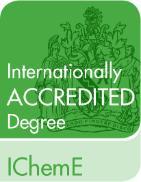Chemical Engineering at the University of Wolverhampton is industry-focused and aims to prepare students to tackle the challenges facing the chemical and allied industries in the 21st century. The central theme of the course is to make you an engineer.
Modern society relies on the work of chemical engineers. They help to manage resources, protect the environment and maintain stringent health and safety procedures, whilst all the while developing the processes that make the products we desire or depend on. The University of Wolverhampton’s Chemical Engineering course provides a deep understanding of chemical processes and the end products from industrial chemical reactions.
On the course, you will learn how raw materials can be transformed into useful products in a safe and cost-effective way. For example, petrol, plastics and synthetic fibres such as polyester and nylon all come from oil. Chemical engineers understand how to alter the chemical, biochemical or physical state of a substance, to create a range of products as diverse as food, cosmetics and pharmaceuticals.
The course covers energy resource exploitation and management, industrial practices and processes, chemical thermodynamics and reaction engineering, process design and control, health and safety, protection of the environment, and petroleum and chemical refining. Our course is aimed squarely at producing engineers. We will ensure you have the correct balance of underpinning science, mathematical skill, and core chemical engineering to ensure that you will have second-to-none employment qualities and expectation.
We are proud to say we are accredited by the Institution of Chemical Engineers (IChemE).

Chemical Engineering is taught at the City Campus in Wolverhampton.
Watch our video below featuring staff and students from Chemical Engineering here at the University of Wolverhampton.


/prod01/wlvacuk/media/departments/digital-content-and-communications/images-18-19/iStock-163641275.jpg)
/prod01/wlvacuk/media/departments/digital-content-and-communications/images-2024/250630-SciFest-1-group-photo-resized-800x450.png)
/prod01/wlvacuk/media/departments/digital-content-and-communications/images-18-19/210818-Iza-and-Mattia-Resized.jpg)
/prod01/wlvacuk/media/departments/digital-content-and-communications/images/Maria-Serria-(teaser-image).jpg)
/prod01/wlvacuk/media/departments/digital-content-and-communications/images-2024/241014-Cyber4ME-Project-Resized.jpg)
/prod01/wlvacuk/media/departments/digital-content-and-communications/images-18-19/210705-bric_LAND_ATTIC_v2_resized.jpg)
/prod01/channel_24/courses/media/departments/faculty-of-science-and-engineering/Quote-with-image-(5).png)

